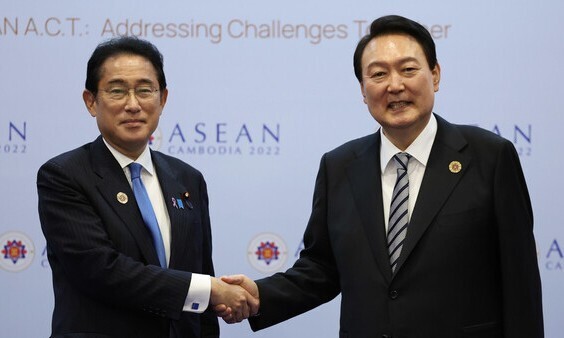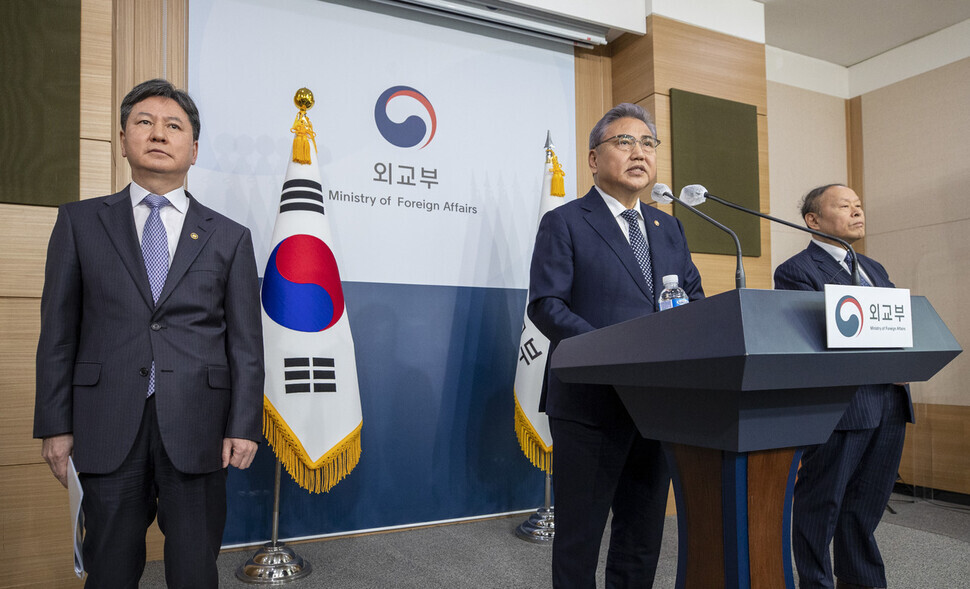hankyoreh
Links to other country sites 다른 나라 사이트 링크
Haste makes waste in Yoon’s rushed plan for beefing up ties with Japan

A “solution” announced by the South Korean government Monday on the compensation of victims of forced labor mobilization during the Japanese occupation — which included no apology from the Japanese government or involvement by the Japanese companies implicated in war crimes — reflected the intentions of South Korean President Yoon Suk-yeol to “resolve the matter quickly,” sources said.
Since taking office, Yoon has made improving South Korea-Japan relations a top diplomatic priority.
For him, the mending of bilateral relations is a necessary step toward achieving his main foreign policy objectives of beefing up the South Korea-US alliance and trilateral military cooperation with Japan. He has also regarded the straining of bilateral ties as a misstep by his predecessor Moon Jae-in’s administration that needed to be rectified.
Criticizing that administration in a briefing Monday, Kim Tae-hyo, the president’s deputy national security advisor, said, “Since surfacing with the Supreme Court decision in 2018, the forced mobilization issue has been neglected after the failure to resolve it during the past administration.”
“Until April of last year, South Korea-Japan relations remained effectively deadlocked,” he added.
A senior official in the presidential office explained, “It had been Japan’s position since the outset that [the Japanese companies found liable] would not be taking part [in compensation] no matter what.”
“Japan’s position has started to shift since the Yoon Suk-yeol administration took office,” they added.
In a weekly meeting at the presidential office the same day with Prime Minister Han Duck-soo, Yoon referred to the announcement of a solution to the forced labor mobilization issue as a “decision made in order to proceed toward a future-oriented South Korea-Japan relationship.”

According to sources, Yoon rejected the Ministry of Foreign Affairs’ calls for a more measured pace in favor of a faster announcement. Recalling the backlash in the wake of an intergovernmental agreement on the military sexual slavery issue in 2015, the ministry had stressed the importance of convincing Tokyo to take “good-faith measures.”
Yoon was “strongly intent” on announcing a solution, a senior presidential office source said Monday.
“The president told his advisors, ‘If we’re going to do it anyway, we’re better off discussing things quickly. Should we wait until before next year’s general elections [to make the announcement]?’” the source explained, adding that the advisors were “unable to say anything in response.”
Sources also said that Yoon instructed Minister of Foreign Affairs Park Jin to “examine an approach where South Korea takes the first step with a bold announcement.”
In a press conference at the time of the announcement Monday, Park spoke of Yoon’s “firm commitment to improving South Korea-Japan relations.”
“In terms of pursuing the national interest, the Ministry of Foreign Affairs and presidential office are working as a single team,” he stressed.
But many critics suggested that by showing how anxious he was to resolve the issue, Yoon gave away the upper hand in negotiations to Japan. With his priority focus on doing things quickly, he weakened Seoul’s own bargaining position, they argued.
Last year, Yoon met three times with Japanese Prime Minister Fumio Kishida: at a NATO summit in June, a UN General Assembly meeting in September, and an ASEAN+3 (South Korea, China, and Japan) summit in November. During those meetings, he repeatedly stressed the need to “resolve current issues quickly.”
The September meeting at the UN in particular was criticized by many as “capitulation,” with Yoon visiting Kishida’s event and wrapping the encounter up in just 30 minutes.
Yoon’s speed campaign appears to have the ultimate aim of beefing up trilateral cooperation with the US and Japan.
National Security Office Director Kim Sung-han, who is currently visiting the US, said Monday that Washington was “looking forward to the upgrading of trilateral security cooperation with South Korea and Japan once a new era arrives in South Korea-Japan relations.”
By Kim Mi-na, staff reporter; Kwon Hyuk-chul, staff reporter; Gil Yun-hyung, staff reporter; Bae Ji-hyun, staff reporter
Please direct questions or comments to [english@hani.co.kr]

Editorial・opinion
![[Editorial] Yoon must halt procurement of SM-3 interceptor missiles [Editorial] Yoon must halt procurement of SM-3 interceptor missiles](https://flexible.img.hani.co.kr/flexible/normal/500/300/imgdb/child/2024/0501/17145495551605_1717145495195344.jpg) [Editorial] Yoon must halt procurement of SM-3 interceptor missiles
[Editorial] Yoon must halt procurement of SM-3 interceptor missiles![[Guest essay] Maybe Korea’s rapid population decline is an opportunity, not a crisis [Guest essay] Maybe Korea’s rapid population decline is an opportunity, not a crisis](https://flexible.img.hani.co.kr/flexible/normal/500/300/imgdb/original/2024/0430/9417144634983596.jpg) [Guest essay] Maybe Korea’s rapid population decline is an opportunity, not a crisis
[Guest essay] Maybe Korea’s rapid population decline is an opportunity, not a crisis- [Column] Can Yoon steer diplomacy with Russia, China back on track?
- [Column] Season 2 of special prosecutor probe may be coming to Korea soon
- [Column] Park Geun-hye déjà vu in Yoon Suk-yeol
- [Editorial] New weight of N. Korea’s nuclear threats makes dialogue all the more urgent
- [Guest essay] The real reason Korea’s new right wants to dub Rhee a founding father
- [Column] ‘Choson’: Is it time we start referring to N. Korea in its own terms?
- [Editorial] Japan’s rewriting of history with Korea has gone too far
- [Column] The president’s questionable capacity for dialogue
Most viewed articles
- 1Months and months of overdue wages are pushing migrant workers in Korea into debt
- 2At heart of West’s handwringing over Chinese ‘overcapacity,’ a battle to lead key future industries
- 3Seoul getting its first-ever vertical farm
- 4Trump asks why US would defend Korea, hints at hiking Seoul’s defense cost burden
- 5[Column] For K-pop idols, is all love forbidden love?
- 6[Editorial] When the choice is kids or career, Korea will never overcome birth rate woes
- 7[Editorial] Yoon must halt procurement of SM-3 interceptor missiles
- 8[Editorial] 10 years on, lessons of Sewol tragedy must never be forgotten
- 9Under conservative chief, Korea’s TRC brands teenage wartime massacre victims as traitors
- 10[Guest essay] Maybe Korea’s rapid population decline is an opportunity, not a crisis